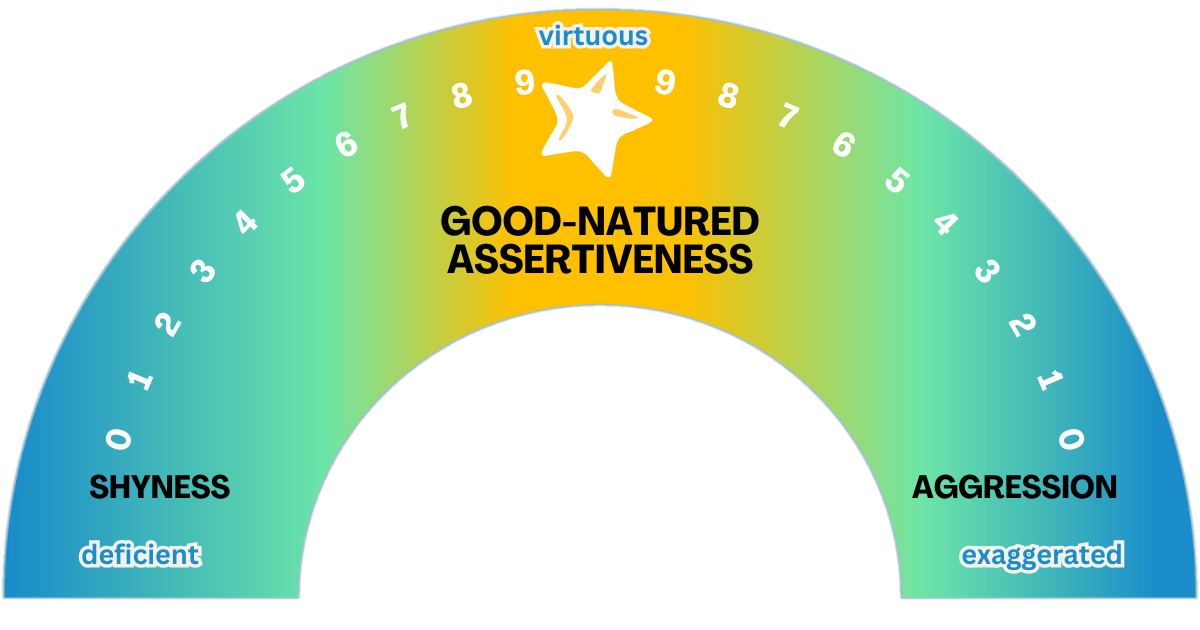In life, expressing ourselves is crucial—whether it’s articulating our thoughts, sharing our ideas, or advocating for our needs. Each of us has our own unique approach to self-expression, shaped by our individual mindsets and habits. In this section, we’ll delve into the character traits and attitudes that influence how we communicate and assert ourselves in various situations.
The Continuum
Along the continuum of self-expression, individuals can fall at various points. On one extreme is shyness, characterized by a reluctance or hesitancy to assert oneself or express opinions or desires. On the other extreme is aggression, marked by forceful or confrontational behavior in expressing oneself, often at the expense of others’ feelings or perspectives. The virtuous path lies in the center, where individuals express themselves assertively yet respectfully, considering others’ feelings and viewpoints.
People may find themselves at various positions on this continuum. To make things even more complex, some may shift their position based on the circumstance. For instance, while some individuals may hold back from expressing themselves in social situations, they may be more assertive when working with colleagues.
Shyness/Meekness: At this end of the spectrum, individuals display a meek or reticent demeanor, often marked by a reluctance to express themselves openly. They may also be prone to allowing others to exert influence over them, lacking assertiveness to stand up for themselves.
Reserve: Progressing, individuals maintain a cautious approach to social interactions, preferring to observe rather than actively participate. They may engage when necessary but remain hesitant to fully express themselves.
Good-Natured Assertiveness: As the median, individuals act with confidence and genuine concern for others. They assert themselves respectfully, balancing their own needs with the consideration of others’ feelings and perspectives.
Domineering: Advancing along the spectrum, individuals display a strong sense of self-assurance and dominance in their interactions. They express themselves openly and confidently, often asserting their viewpoints with authority and control, potentially overshadowing the perspectives or needs of others.
Aggression: At the extreme end of the continuum, individuals exhibit forceful or hostile behavior, often characterized by a readiness to attack or confront others. They may prioritize their own needs and desires at the expense of others’ well-being.
Benefits of Good-Natured Assertiveness
When we embrace good-natured assertiveness, finding the delicate balance between shyness and aggression, we empower ourselves to express our thoughts and needs confidently while respecting the perspectives of others. This balance fosters healthy communication, allowing us to assert ourselves effectively without dominating or alienating those around us.
Here are some benefits:
Enhanced relationships. Good-natured individuals cultivate strong, positive relationships based on trust, respect, and empathy.
Improved Communication. They excel in communication, expressing themselves assertively yet respectfully, leading to clearer understanding and effective problem-solving.
Increased Happiness. Living a life of good-naturedness fosters a sense of fulfillment and contentment as they contribute positively to the well-being of others.
Reduced Conflict. Their ability to consider others’ perspectives and feelings helps in avoiding unnecessary conflicts and promotes peaceful resolutions.
Greater Influence. Good-natured individuals often have a positive influence on those around them, inspiring others to adopt similar attitudes and behaviors.
Personal Growth. Practicing good-naturedness encourages continual self-improvement, fostering qualities such as patience, empathy, and understanding.
Contribution to a Harmonious Society. By prioritizing kindness and consideration, they contribute to building a more compassionate and inclusive community.



